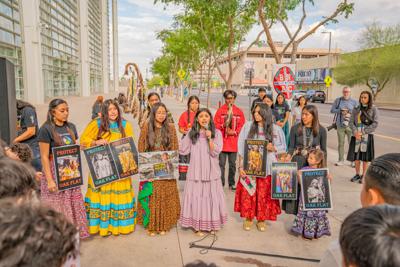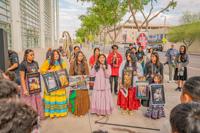
Indigenous and environmental rights activists protest the destruction of Oak Flat.
The fight to protect Oak Flat, a sacred Western Apache site east of Phoenix, suffered a significant loss Tuesday after the U.S. Supreme Court cleared a hurdle for the mining of the publicly owned land that Indigenous and environmental rights activists have fought against for years.
The high court refused to hear the case of Apache Stronghold v. United States, in which a coalition of Apache, Indigenous and other allies sought to prevent the transfer of public land known as Oak Flat — which sits just outside of Superior, Arizona — over to Resolution Copper.
Oak Flat, or Chi’chil Biłdagoteel in Apache, is listed in the National Register of Historic Places as a Western Apache Traditional Cultural Property and National Historic District. For centuries, this site has been the center of sacred ceremonies for Western Apache people that cannot be held anywhere else.
Resolution Copper intends to turn the sacred site into a two-mile-wide and 1,100-foot-deep crater in order to mine what is said to be the second-largest copper deposit in the world. The proposal saw the light of day in 2014 when Congress passed a bill that allowed the transfer.
In 2021, Apache Stronghold filed a lawsuit to prevent the proposal from becoming reality under the Religious Freedom Restoration Act and the Free Exercise Clause. In 2024, the United States Court of Appeals for the Ninth Circuit rejected both claims, while also acknowledging that the transfer of land would prevent the Apaches from exercising their religious freedom but would not substantially burden it.
Soon after, in its petition to the Supreme Court to review the lower court’s decision, Becket Law, a religious freedom nonprofit law firm representing Apache Stronghold, wrote that clearing the way for Resolution Copper would “undisputedly destroy Oak Flat—swallowing it in a massive crater and ending sacred Apache rituals forever.”
Vickey Peacey, general manager at Resolution Copper, celebrated the high court’s move to allow the Ninth Circuit court’s decision to stand, saying that the “Resolution Copper mine is vital to securing America’s energy future, infrastructure needs, and national defense with a domestic supply of copper and other critical minerals.”
In a dissent letter written on Tuesday by Justice Neil Gorsuch, with Justice Clarence Thomas in agreement, Gorsuch expressed his disapproval of the court’s decision to simply “shuffle this case off our docket” and not allow activists to present their case.
“Just imagine if the government sought to demolish a historic cathedral on so questionable a chain of legal reasoning. I have no doubt that we would find that case worth our time. Faced with the government’s plan to destroy an ancient site of tribal worship, we owe the Apaches no less,” Gorsuch wrote.
In a statement released by Beckett early Tuesday, Dr. Wendsler Nosie Sr. of Apache Stronghold stated that they would not allow this decision to deter them from fighting to protect Oak Flat. “While this decision is a heavy blow, our struggle is far from over. We urge Congress to take decisive action to stop this injustice while we press forward in the courts,” he said.
“It is hard to imagine a more brazen attack on faith than blasting the birthplace of Apache religion into a gaping crater,” said Luke Goodrich, vice president and senior counsel at Becket, in the same statement. “The Court’s refusal to halt the destruction is a tragic departure from its strong record of defending religious freedom. We will do everything in our power to ensure that the Apaches can continue worshiping at Oak Flat as they have for generations.”













(0) comments
Welcome to the discussion.
Log In
Keep it Clean. Please avoid obscene, vulgar, lewd, racist or sexually-oriented language.
PLEASE TURN OFF YOUR CAPS LOCK.
Don't Threaten. Threats of harming another person will not be tolerated.
Be Truthful. Don't knowingly lie about anyone or anything.
Be Nice. No racism, sexism or any sort of -ism that is degrading to another person.
Be Proactive. Use the 'Report' link on each comment to let us know of abusive posts.
Share with Us. We'd love to hear eyewitness accounts, the history behind an article.